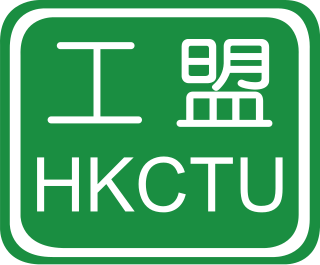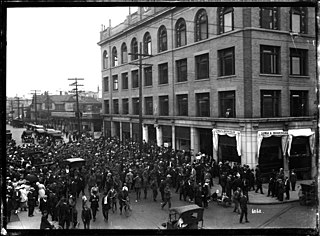A trade union, often simply called a union, is an organization of workers who have come together to achieve many common goals, such as protecting the integrity of their trade, improving safety standards, and attaining better wages, benefits, and working conditions through the increased bargaining power wielded by the creation of a monopoly of the workers. Trade unions typically fund the formal organization, head office, and legal team functions of the trade union through regular fees or union dues. The delegate staff of the trade union representation in the workforce are made up of workplace volunteers who are appointed by members in democratic elections.
Labour law mediates the relationship between workers, employing entities, trade unions and the government. Collective labour law relates to the tripartite relationship between employee, employer and union. Individual labour law concerns employees' rights at work also through the contract for work. Employment standards are social norms for the minimum socially acceptable conditions under which employees or contractors are allowed to work. Government agencies enforce labour law.
Collective bargaining is a process of negotiation between employers and a group of employees aimed at agreements to regulate working salaries, working conditions, benefits, and other aspects of workers' compensation and rights for workers. The interests of the employees are commonly presented by representatives of a trade union to which the employees belong. The collective agreements reached by these negotiations usually set out wage scales, working hours, training, health and safety, overtime, grievance mechanisms, and rights to participate in workplace or company affairs.

The Hong Kong Confederation of Trade Unions (HKCTU) is a pro-democracy labour and political group in the Hong Kong. It was established in 1990. It has 160,000 members in 61 affiliates and has representation in the Legislative Council of Hong Kong (LegCo) to challenge government policies and push for legal protection of worker and trade union rights. It is one of the two most influential labour groups in Hong Kong..

The Swedish Trade Union Confederation, commonly referred to as LO, is a national trade union centre, an umbrella organisation for fourteen Swedish trade unions that organise mainly "blue-collar" workers. The Confederation, which gathers in total about 1.5 million employees out of Sweden's 10 million people population, was founded in 1898 by blue-collar unions on the initiative of the 1897 Scandinavian Labour Congress and the Swedish Social Democratic Party, which almost exclusively was made up by trade unions. In 2019 union density of Swedish blue-collar workers was 60%, a decline by seventeen percentage points since 2006. A strongly contributing factor was the considerably raised fees to union unemployment funds in January 2007 made by the new centre-right government.
Enterprise bargaining is an Australian term for a form of collective bargaining, in which wages and working conditions are negotiated at the level of the individual organisations, as distinct from sectoral collective bargaining across whole industries. Once established, they are legally binding on employers and employees that are covered by the Enterprise bargaining agreement. An Enterprise Agreement (EA) consists of a collective industrial agreement between either an employer and a trade union acting on behalf of employees or an employer and employees acting for themselves.

The European Trade Union Confederation (ETUC) is the major trade union organisation representing workers at European level. European integration has reinforced the EU's role in economic, employment and social policy throughout the 28 Member States. The ETUC is a European social partner, which means that the European Commission consults it when developing social and economic policies. It also negotiates autonomous agreements and work programmes with European employers. And it coordinates the national and sectoral policies of its affiliates on social and economic matters, particularly in the framework of the EU institutional processes, including European economic governance and the EU Semester.
Mexican labor law governs the process by which workers in Mexico may organize labor unions, engage in collective bargaining, and strike. Current labor law reflects the historic interrelation between the state and the Confederation of Mexican Workers, the labor confederation officially aligned with the Institutional Revolutionary Party, which ruled Mexico under various names for more than seventy years.
Social partners are groups that cooperate in working relationships to achieve a mutually agreed upon goal, typically to the benefit of all involved groups. Examples of social partners include employers, employees, trade unions, government, etc.
Social partnership is the term used for the tripartite, triennial national pay agreements reached in Ireland.
The Right to Organise and Collective Bargaining Convention (1949) No 98 is an International Labour Organization Convention. It is one of eight ILO fundamental conventions.
The Estonian Trade Union Confederation (EAKL) is a trade union centre in Estonia. It is affiliated with the International Trade Union Confederation (ITUC), and the European Trade Union Confederation (ETUC).

The European Metalworkers' Federation (EMF), founded in 1971, is a federation of 68 metalworkers' unions from 31 countries, representing a combined total of 6.5 million affiliates. It is based in Brussels, Belgium, the general secretary is Ulrich Eckelman and Bart Samyn is the Deputy General Secretary. The organisation was dissolved on 15 May 2012, to become a part - together with EMCEF and ETUF-TCL - of the newly created organisation industriAll European Trade Union on 16 May 2012

Labor relations is a field of study that can have different meanings depending on the context in which it is used. In an international context, it is a subfield of labor history that studies the human relations with regard to work – in its broadest sense – and how this connects to questions of social inequality. It explicitly encompasses unregulated, historical, and non-Western forms of labor. Here, labor relations define "for or with whom one works and under what rules. These rules determine the type of work, type and amount of remuneration, working hours, degrees of physical and psychological strain, as well as the degree of freedom and autonomy associated with the work."
A collective agreement, collective labour agreement (CLA) or collective bargaining agreement (CBA) is a written contract negotiated through collective bargaining for employees by one or more trade unions with the management of a company that regulates the terms and conditions of employees at work. This includes regulating the wages, benefits, and duties of the employees and the duties and responsibilities of the employer or employers and often includes rules for a dispute resolution process.
South African labour law regulates the relationship between employers, employees and trade unions in the Republic of South Africa.
SA8000 is an auditable certification standard that encourages organizations to develop, maintain, and apply socially acceptable practices in the workplace. It was developed in 1989 by Social Accountability International, formerly the Council on Economic Priorities, by an advisory board consisting of trade unions, NGOs, civil society organizations and companies. The SA8000's criteria were developed from various industry and corporate codes to create a common standard for social welfare compliance.
Sectoral collective bargaining is an aim of trade unions or labor unions to reach a collective agreement that covers all workers in a sector of the economy. It contrasts to enterprise bargaining where agreements cover individual firms. Generally countries with sectoral collective bargaining have higher rates of union organisation and better coverage of collective agreements than countries with enterprise bargaining.
Collective agreement coverage or union representation refers to the proportion of people in a country population whose terms and conditions at work are made by collective bargaining, between an employer and a trade union, rather than by individual contracts. This is invariably higher than the union membership rate, because collective agreements almost always protect non-members in a unionised workplace. This means that, rather than individuals who have weaker bargaining power representing themselves in negotiations, people organise to represent each other together when negotiating for better pay and conditions in their workplace. The number of people who are covered by collective agreements is higher than the number of union members, and in many cases substantially higher, because when trade unions make collective agreements they aim to cover everyone at work, even those who have not necessarily joined for membership.
The union density or union membership rate conveys the number of trade union members who are employees as a percentage of the total number of employees in a given industry or country. This is normally lower than collective agreement coverage rate, which refers to all people whose terms of work are collectively negotiated. Trade unions bargain with employers to improve pay, conditions, and decision-making in workplaces; higher rates of union density within an industry or country will generally indicate higher levels of trade union bargaining power, lower rates of density will indicate less bargaining power.





